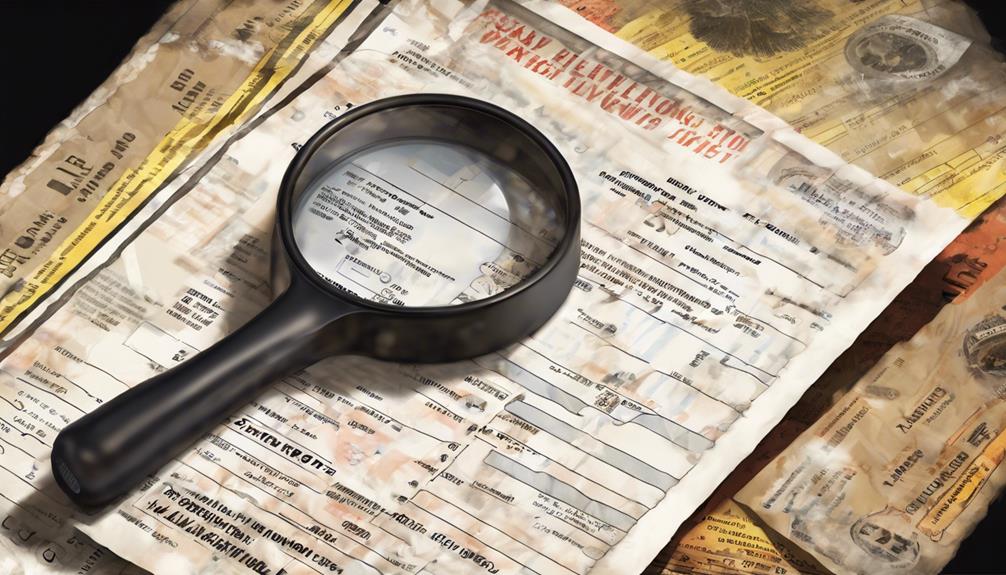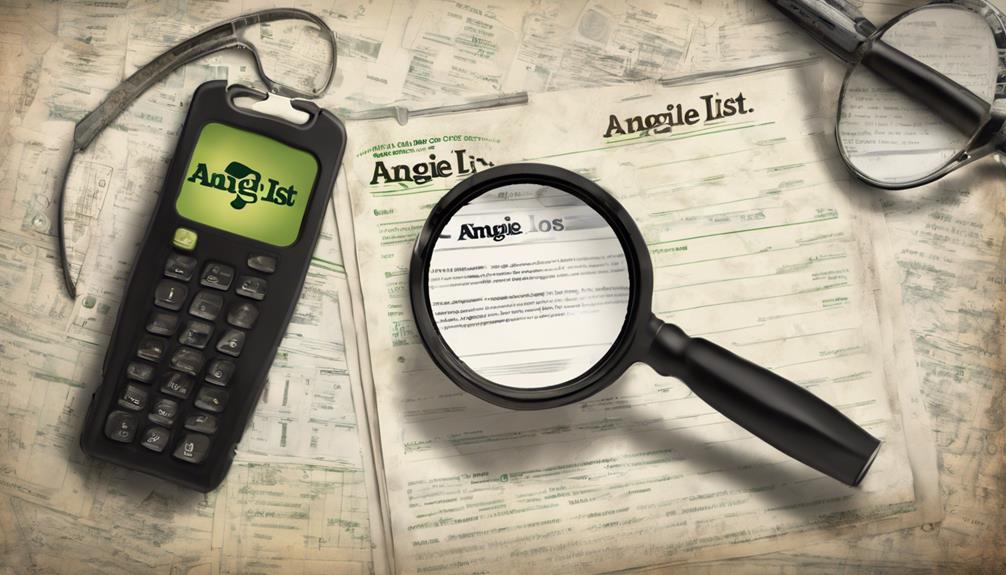FCRA background checks typically go back seven years for most non-criminal details. Exceptions may allow for longer reporting periods in certain cases. If more insight is desired, further details on FCRA time limits, exceptions, criminal convictions reporting rules, authorization requirements, minors, and specific types of background checks can be discovered.
Key Takeaways
- FCRA background checks typically go back 7 years for most negative information.
- Exceptions exist for certain situations, allowing for longer reporting periods.
- Criminal convictions can be reported indefinitely under FCRA guidelines.
- Some states impose a 7-year limit on reporting criminal records.
- Understanding FCRA regulations is crucial for employers and employees involved in background checks.
FCRA Time Limits Overview

The FCRA establishes clear time limits for various types of background checks, ensuring consistency and accuracy in reporting practices.
Under the Fair Credit Reporting Act (FCRA), specific guidelines govern the duration for which certain information can be included in background checks. For instance, bankruptcies aren't reportable after 10 years, while tax liens are typically not included after 7 years post-payment. Similarly, collection accounts fall under the same 7-year limit.
Moreover, civil suits, judgments, and other negative information are also not reportable after 7 years, in line with FCRA regulations. These time limits aim to provide a fair and updated representation of an individual's financial and legal history while also giving due consideration to the relevance and recency of past events.
Adhering to these time limits helps maintain the integrity and accuracy of background checks conducted under the FCRA.
Exceptions to FCRA Standards
Exceptions to FCRA standards are essential to grasp, as they can impact the depth and scope of background checks for specific individuals, especially those applying for high-paying positions.
These exceptions may lead to variations in the time limits set by the FCRA, affecting the reporting process and the information available to employers.
Being aware of these exceptions and their implications is critical for both employers and job seekers to guarantee compliance with FCRA regulations and protection of privacy rights.
FCRA Exceptions Overview
When considering background checks under the FCRA, it's crucial to be aware of exceptions that may extend beyond the standard 7-year limit.
These exceptions permit the reporting of adverse information beyond the typical timeframe, especially for high-salary job applicants or positions with an annual salary of $75,000 or more.
Failure to adhere to FCRA standards regarding these exceptions can result in violations of privacy rights and potential legal consequences for employers.
Both employers and employees involved in the background check process must understand these FCRA exceptions to ensure compliance with national standards on time limits for background checks.
Time Limit Variations
Employers sometimes face situations where background checks require an extension beyond the standard time limits set by the FCRA. Exceptions to FCRA standards allow for longer reporting periods, especially for high-wage jobs.
Certain industries or specific positions may have regulatory requirements that necessitate background checks going back further than what the FCRA mandates. Additionally, state laws can also impact how far back background checks can explore, potentially overriding FCRA standards.
To guarantee compliance with all relevant regulations, employers must be aware of these exceptions and variations in time limits for background checks. By understanding the subtleties of longer reporting periods permitted in specific cases, employers can navigate the complexities of background checks for roles where standard FCRA guidelines may not fully apply.
Staying informed about the exceptions to FCRA standards is essential for organizations looking to conduct thorough and accurate background screenings within the bounds of the law.
Impact on Reporting
Certain situations may require reporting information beyond the standard 7-year limit established by the FCRA. For example, job applicants with high salaries may not be bound by the usual 7-year reporting cap, as their roles may necessitate more comprehensive background investigations.
Furthermore, criminal convictions may be disclosed at any point, irrespective of the 7-year regulation. However, it's vital to highlight that certain states, like Texas, impose restrictions on disclosing criminal convictions that surpass 7 years.
Employers conducting background screenings must be mindful of these deviations from FCRA norms to guarantee adherence and precision in their reporting procedures. Comprehending the implications of these deviations on reporting is fundamental for employers to make well-informed choices regarding recruitment processes and candidate assessments.
Reporting Bankruptcies and Tax Liens

Bankruptcies and tax liens have specific time limits for reporting on FCRA background checks. Bankruptcies are typically reportable for 10 years from the filing date, after which they shouldn't appear on the background check report.
Similarly, tax liens are usually not reportable after 7 years from the date of payment. Collection accounts, civil suits, judgments, and negative financial information also fall under the 7-year reporting limit set by the FCRA.
It's important to note that exceptions to these time limits may exist, especially for high-salary job applicants under certain circumstances.
Criminal Convictions Reporting Rules
Employers managing FCRA guidelines must understand the rules surrounding reporting criminal convictions, as they can impact the hiring process greatly.
While FCRA allows for reporting criminal convictions at any time, some states impose a 7-year limit on background checks.
Exceptions to this rule exist, especially for high-salary job applicants, adding complexity to the hiring process.
Time Limits for Reporting
Background checks under the FCRA have no specific time limit for reporting criminal convictions, allowing for indefinite reporting of such records.
While some states, like Texas, follow a 7-year rule for reporting criminal convictions in background checks, FCRA guidelines don't impose such restrictions.
Texas law restricts the reporting of criminal convictions older than 7 years, with exceptions for high-salary job applicants. Employers conducting background checks must adhere to FCRA guidelines, which don't set a maximum time limit for reporting criminal convictions.
This lack of a specific time limit means that employers can report criminal convictions regardless of how long ago they occurred. It's essential for employers to follow FCRA guidelines meticulously to ensure compliance and fairness in the reporting of criminal convictions during background checks.
Impact on Hiring
The guidelines for reporting criminal convictions under the FCRA have significant implications on the hiring process. While the FCRA allows for the indefinite reporting of criminal convictions, some states, like Texas, adhere to a seven-year rule for background checks. It's essential for employers to navigate both federal laws and state regulations when considering criminal convictions in hiring practices.
Exceptions to the seven-year rule are in place for high-salary positions under the FCRA. These exceptions recognize that certain roles may require a deeper look into an individual's background, regardless of the time that has passed since a conviction. Employers must be diligent in understanding these exceptions and how they apply to their specific hiring processes.
In light of these regulations, employers conducting background checks must strike a balance between following the law, ensuring fair employment practices, and making informed hiring decisions based on an individual's qualifications and criminal history.
Permission Requirements for Background Checks

To initiate a background check process under the FCRA, written approval from applicants is a mandatory requirement. Employers must obtain explicit authorization before conducting any background checks to ensure adherence with FCRA regulations. This authorization must be obtained separately from the job application, and the purpose of the background check must be clearly communicated to the applicant. Additionally, written notification about the background check is essential to keep the applicant informed throughout the process. Failure to obtain proper authorization for a background check can lead to violations of the applicant's privacy rights and legal repercussions for the employer.
| Authorization Requirements for Background Checks | |
|---|---|
| Requirement | Details |
| Written Approval | Mandatory for FCRA compliance |
| Separate Document | Authorization must be obtained apart from the job application |
| Clear Purpose | Purpose of the background check must be specified to the applicant |
| Written Notification | Mandatory to inform the applicant about the background check |
Minors and Background Check Regulations
Minors, being exempt from typical background check regulations, aren't subject to the same time limits as adults due to their lack of credit history or records.
Credit bureaus don't maintain files on minors, making them ineligible for standard background checks.
Juvenile criminal convictions are usually not included in background checks to protect the privacy protections afforded to minors.
Since minors can't provide legal consent for background checks, due to contracts being voidable with minors, they're safeguarded from intrusive inquiries into their backgrounds.
The absence of credit history and records for minors ensures that background check regulations and time limits don't apply to them, reinforcing their rights to privacy.
These FCRA exemptions shield minors from unnecessary scrutiny and protect their privacy during background checks.
Specific Types of Background Checks

When conducting specific types of background checks, employers must adhere to the guidelines established by the FCRA to guarantee accurate and consistent reporting of criminal convictions. Under the FCRA, criminal convictions can be reported indefinitely, ensuring that employers have access to relevant information for hiring decisions.
Misdemeanor records, on the other hand, are typically reported for up to seven years in FCRA background checks, providing a window into an individual's recent criminal history. However, Juvenile records and court-sealed documents are often excluded from FCRA background checks, protecting individuals from having certain past mistakes impact their future opportunities.
While some states impose seven-year limits on reporting criminal records, it's crucial to remember that FCRA guidelines apply nationwide, ensuring a standardized approach to background checks regardless of state laws. By following federal guidelines, employers can conduct thorough background checks while respecting reporting limitations and maintaining fairness in the hiring process.
Importance of Understanding Background Checks
Understanding the significance of background checks is vital for both employers and employees in maintaining transparency and fairness in the hiring process.
Adhering to FCRA regulations is pivotal for employers as it sets national standards on how far back background checks can search, guaranteeing consistency across different states. Compliance with FCRA guidelines not only helps employers make informed decisions but also protects the privacy rights of individuals undergoing background checks.
It's essential for both employers and employees to be aware of their rights and responsibilities under FCRA when conducting or being subjected to background checks. By understanding FCRA time limits on reporting, employers can ensure that outdated or irrelevant information doesn't unfairly impact job candidates.
Ultimately, a thorough understanding of background checks and FCRA regulations is crucial in fostering a fair and balanced hiring process for all parties involved.
Frequently Asked Questions
How Far Back Do Most Criminal Background Checks Go?
Most criminal background checks typically go back 7 years for non-convictions and 7-10 years for convictions. FCRA allows reporting of criminal convictions indefinitely, overriding state limitations. Employers must follow FCRA guidelines for determining background check scope.
Does FCRA Apply to All Background Checks?
Pertaining to all background checks, the FCRA applies solely to those conducted by consumer reporting agencies for employment purposes. Its regulations establish national standards governing the scope and handling of background information.
What States Follow the 7 Year Rule Background Checks?
States like California, Colorado, Kansas, Maryland, Massachusetts, Montana, Nevada, New Hampshire, New York, Texas, and Washington follow the 7-year rule for background checks. They restrict reporting certain information beyond that timeframe to align with FCRA standards.
How Far Back Is a Federal Background Check?
Delving into one's past, a federal background check can reveal a lifetime of criminal history. Through FBI databases and specialized fingerprint checks, these searches have the capacity to reach back to uncover detailed criminal information.
Are FCRA Background Checks and Fingerprint Background Checks the Same in Terms of Timeframe?
No, FCRA background checks and fingerprint background checks differ in timeframe. While FCRA background checks usually take a few days, the fingerprint background check length can vary depending on the jurisdiction and the complexity of the check, often taking several weeks to complete.
Conclusion
To sum up, understanding the time limits and regulations of FCRA background checks is essential for both employers and individuals.
Like a well-crafted puzzle, knowing the boundaries and exceptions of these checks can help navigate the intricacies of the hiring process with ease and confidence.
By staying informed and aware of the guidelines set forth by the FCRA, both parties can guarantee a fair and accurate screening process.








